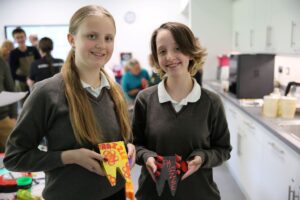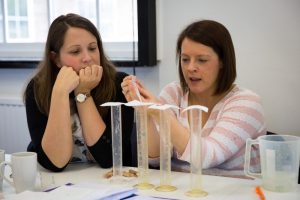Science Oxford – year in review and hope for 2021
Wednesday 13th January 2021
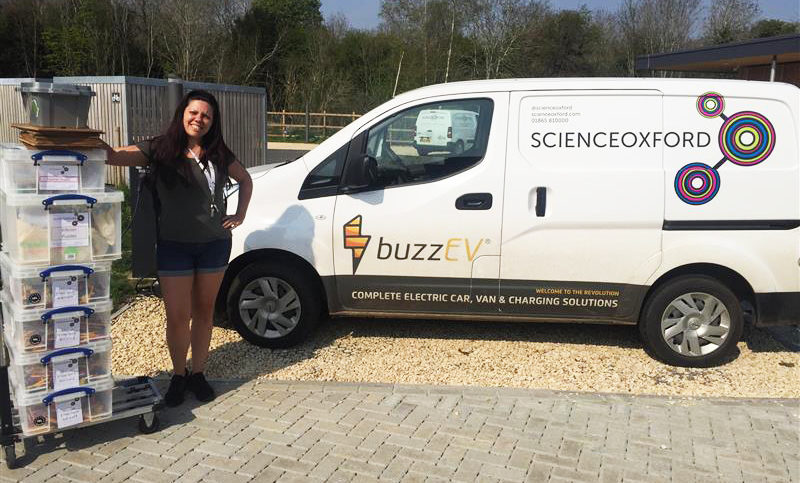
What a year! 2020 started with our programmes in full swing – our new Science Oxford Centre was booked with school visits until July, our public family days were continually sold out and the outreach team were busy running activities in local schools. As with many other organisations across the country, we had to suspend operations in March but between lockdowns and Tiers, we didn’t forget our mission to inspire young people about science, technology, engineering and maths. Here’s a round-up of what we did next, and what we can look forward to in 2021…
Free Kit loan for local schools
The Science Oxford team sprung into action and delivered our science kits (pictured above) for free to local primaries for children of keyworkers and vulnerable children in school during lockdown to use in class. In lockdown 3 we are here to help, and we’re offering the same service for schools who belong to our membership scheme. You can find details of kits available or get in touch via [email protected].
Move to online
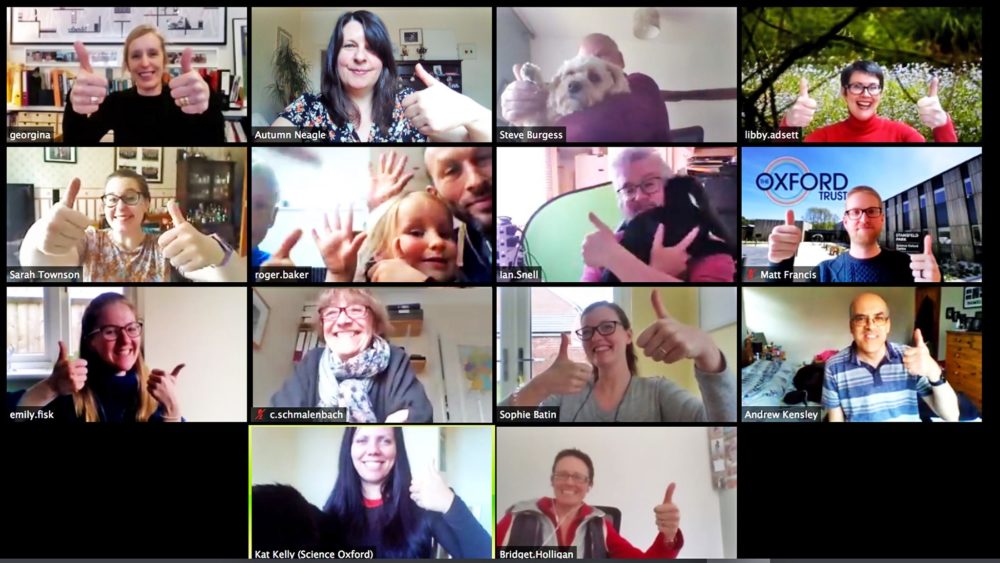
Our fantastic team adapted to working from home and flexible furlough as we entered the world of Zoom, keeping up morale with kitchen science – from sourdough starter chemistry to home baking – and contributing individually to amazing COVID-19 community support projects.
Like many cultural and educational organisations in 2020 we responded to the impact of COVID-19 by moving some of our programmes online. We developed online science resources for families at home or children still at school – you can check out our ongoing activities, video challenges and recommended resources here. We began delivering online training for teachers and university researchers, which proved great success and we continue to offer online CPD and STEM training in 2021.
Our regular Creative Computing Clubs have also been developed and delivered as a mix of online and face-to-face sessions so that we continue to engage young people and enable them to develop their coding and making skills. Our next club is online on Saturday 16th January, where we help kids come up with innovative projects for the ‘do your :bit’ micro:bit Global Goals challenge – see here.
Our first Big Science Event at Home
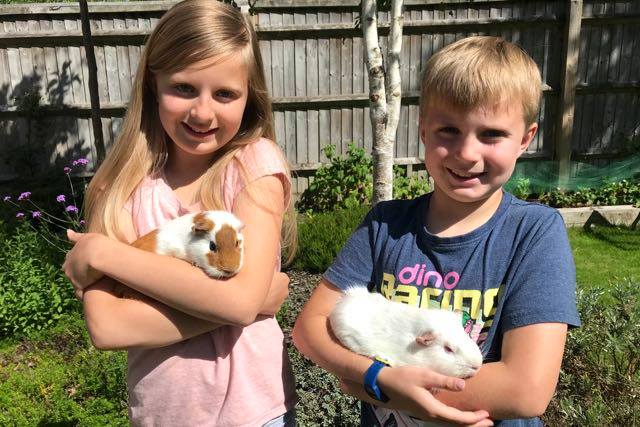
In June, we launched the Big Science Event at Home to engage young people with science and show them that they could still be scientists – even in their own kitchens and gardens. We had over 160 entries involving over 360 young people and, although most were local, we reached children as far away as Scotland and the USA! The questions children investigated were wonderful and varied, including “How long does it take for spaghetti to become wiggly?” and “Which room does our dog Rosie like best?” The winners, Leah and Harry Gould, involved their pets, Snowy and Toffee, asking “Which maze will the guinea pigs complete the fastest; sight, memory or smell?” The Big Science Event at Home was generously funded by the Evolution Education Trust, with support from local sponsors Abbott, Playforce, Diamond Light Source and The Curiosity Box. For those that are interested our Big Science Event at School is still open for registration for 2021 and we are adapting how we run it this year to take account of the current lockdown – schools can register here.
Nationwide campaign for science centres
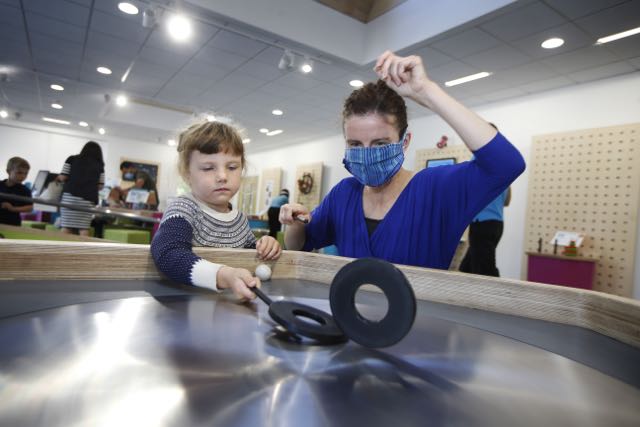
Science Oxford joined over 50 members of the Association for Science and Discovery Centres in a nationwide campaign for an Emergency Resilience Fund #ScienceCentresForOurFuture to support the UK’s world class network of regional science centres that were largely excluded from the support offered to the cultural sector. The campaign was backed by some of the UK’s leading science advocates – Professor Alice Roberts, Professor Brian Cox, Major Tim Peake and Sir Paul Nurse – with over 150 people signing an open letter to Government. Science Oxford was supported by our local MP Anneliese Dodds pictured above visiting our Science Oxford Centre.
Virtual events for secondary students

With the start of the new academic year, we also developed key elements of our STEM Careers Programme for secondary students as virtual experiences. Our STEM Insight Week in October gave pupils from nine local schools the opportunity to interact with cutting-edge biomedical STEM organisations; to go on virtual tours of their facilities; to meet their scientists and engineers and to find out more about their research, technology and career opportunities including their responses to COVID-19. Organisations offering experiences to students included the Medical Research Council, Cochrane, Vertex and Abbott Diabetes Care. We will be running a similar virtual event in February half-term for those interested in a career in computer sciences – students can find out more and sign up here.
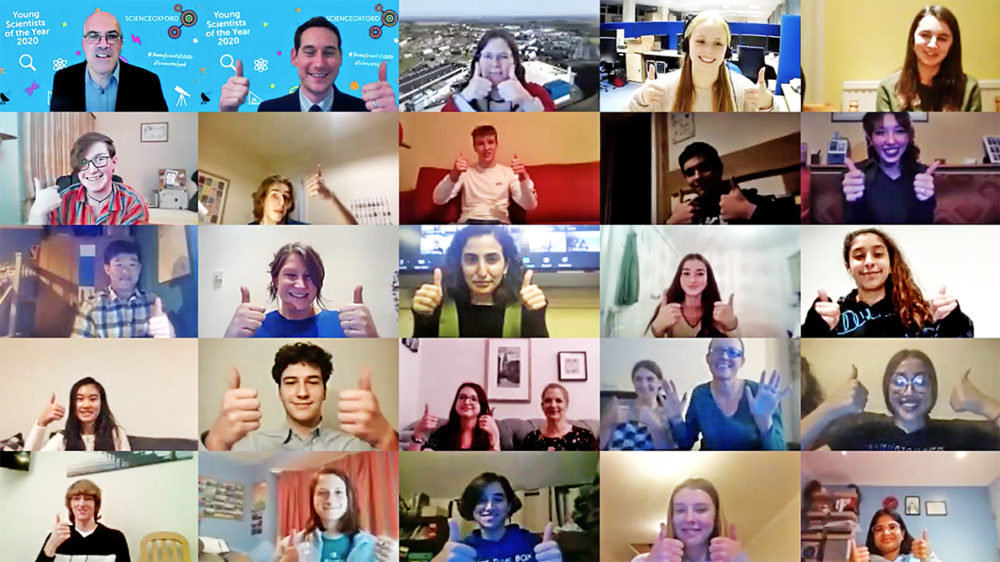
We also ran our annual Young Scientists of the Year celebration events online, as it currently seems more important than ever to celebrate the achievements and passion for science of Year 13 students in Oxfordshire and Buckinghamshire. Over 70 students took part from 32 schools and the events included multiple presentations from people working locally in STEM.
And there were other successes too
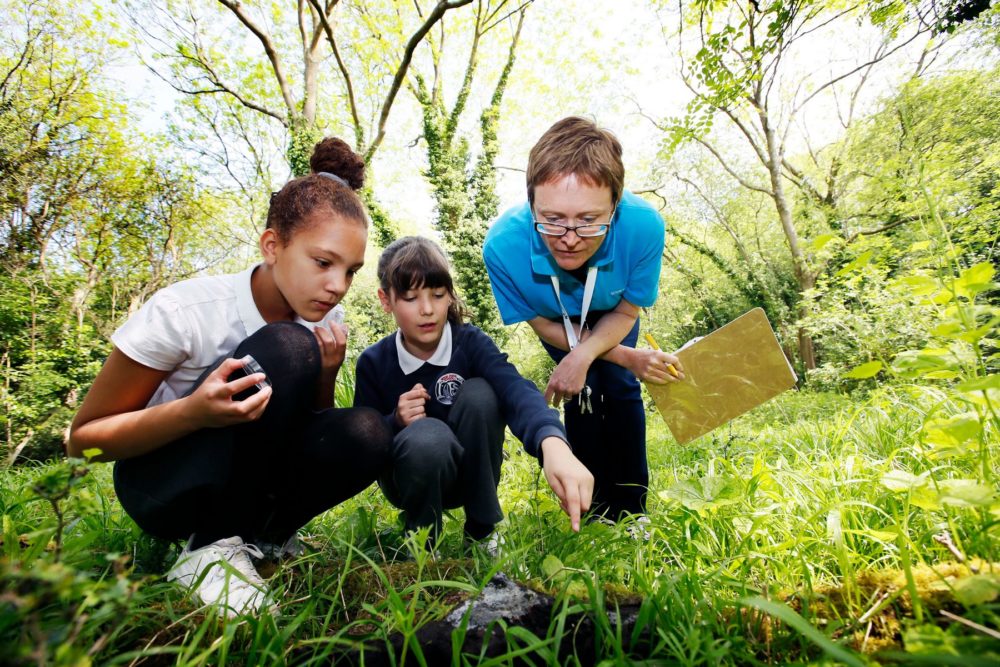
Our flagship, evidence-based, primary science education work, Thinking, Doing, Talking Science (TDTS) has seen the Education Endowment Foundation fund a further effectiveness trial for TDTS from 2021–23, giving us an opportunity to see if we can replicate, at national scale, the positive impact the programme has on pupil attainment and attitudes in science. The first academic paper about the impact of the TDTS professional development programme for primary teachers was also published this year in the International Journal of Science Education (Volume 42, Issue 15). And our Director for Education and Engagement, Bridget Holligan (pictured above), won the Beetlestone Award in July for her vision, legacy and leadership in the field of informal science learning.
Support for diverse audiences

In spring 2020, Science Oxford was involved in Expert Explainers, a national programme led by the Association of Science and Discovery Centres and the Science Museum Group, to increase diversity and inclusion in science. We ran a programme with Headington Partnership for 10-11 year olds from local schools and their families to get them involved and feel that science could be an option for them.
Branching out
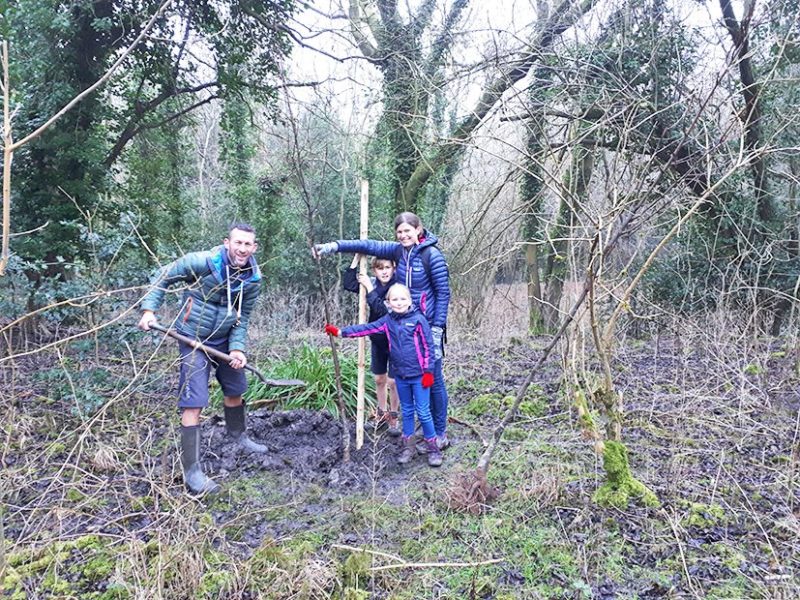
We were funded by the Tree Council Branching Out Fund to plant 25 trees in the 15-acre woodland surrounding our Science Oxford Centre in Headington, which were dug in by a group of socially distanced volunteers at our Conservation Day during National Tree Week 2020. We have planted more than 150 new trees over the last couple of years, and not only will the trees help the environment but they will have long-term education benefits by involving local schools to identify, measure and monitor the growth of individual species. Our conservation project in the woodland is going strong, thanks to the ongoing support of Oxford Conservation Volunteers and local helpers of all ages, as access to and enjoyment of the natural environment grows even more important for children and families in 2021. Why not get some fresh air and exercise and come along to our next Conservation Day – details coming soon!
(Pictured above – our Outdoor Ecology Manager Roger Baker and family, in shorts whatever the weather!)
Remember to look up at the stars

As Professor Stephen Hawking once said, “Remember to look up at the stars and not down at your feet.” Despite all the opening and closing of programmes and the current lockdown, we are looking forward to 2021. Thanks to Abbot we now have an amazing portable science dome or planetarium for use both at the Science Oxford Centre as well as for outreach and we will be trialling our first astronomy shows later this year. That’s not all, thanks to a grant from Garfield Weston, we are also building a new outdoor water exhibit for the Science Oxford Centre that will give children the opportunity to explore the power and properties of water by developing dams, looking at vortexes and flow of water as well as specific investigations developed by our staff.
And thanks to a grant from the Evolution Education Trust, we will be able to make better use of our ‘Live Lab’ in the Science Oxford Centre. We are now planning to offer regular demonstrations and short workshop activities for visitors, created by Science Oxford staff and by local STEM volunteers looking for opportunities to engage people with their research and technology. Although COVID-19 has made it difficult to begin work on this project in 2020, we are really excited to be able to move forward with this in 2021 and offer more diverse and cutting-edge science experiences to our visitors.
Thirty years of science magic
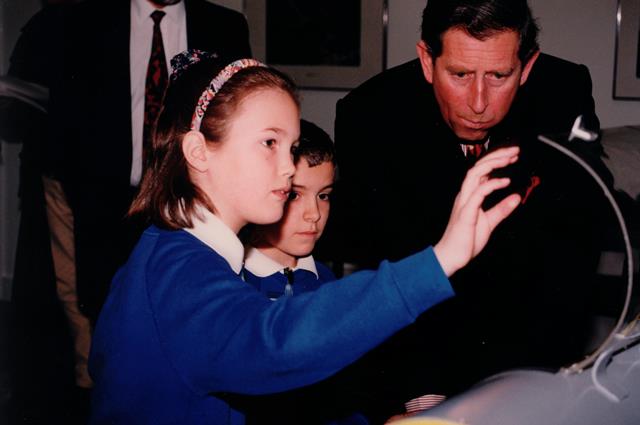
In October, we marked the 30-year anniversary of our very first science centre which opened to the public in 1990. Since then, Science Oxford has inspired countless children and their families – and even royals – about science, technology, engineering and maths. A legacy we have continued with our new Science Oxford Centre in Headington.
Children’s natural curiosity about their world has often been eroded by the time they start secondary school and it becomes more difficult to engage students in science. We know the foundations laid in early childhood and primary education are crucial to STEM proficiency and interest in STEM subjects and that’s why our Science Oxford education outreach programmes and Science Oxford Centre have a particular focus on this age group. We give children the opportunity to experience the excitement of investigation, exploration, experimentation and discovery and show children that science is something that they can do and can lead to an amazing career.
Science education and enterprise
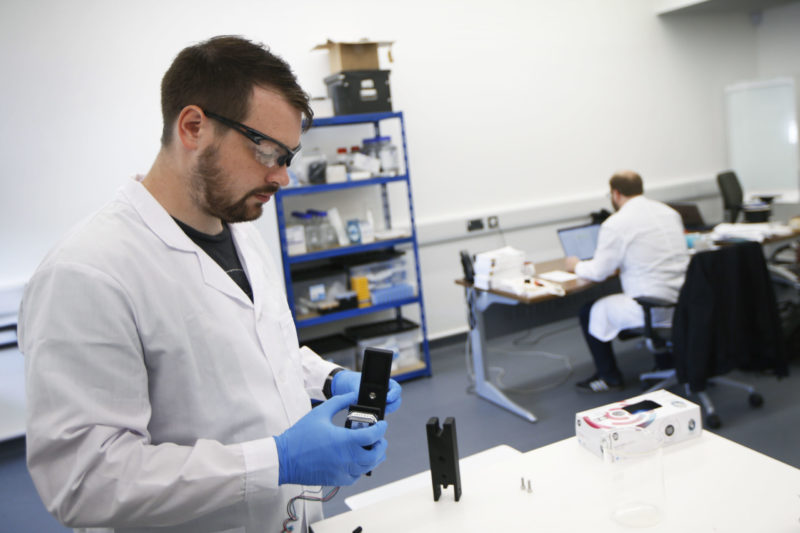
In fact, one of our newest residents at our Wood Centre for Innovation is a “graduate” of Science Oxford. As a teenager Alex Greenhalgh, CEO and Co-founder of Spintex, won a Nuffield Foundation Bursary in microbiology through one of our programmes and has now gone on to set up a brilliant new start-up that is developing artificially spun silk. What do we say we are trying to do? Inspire the next generation of scientists and innovators…

